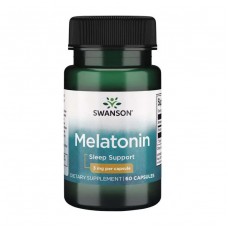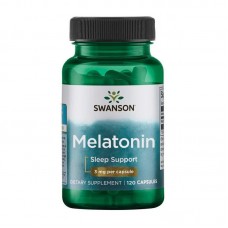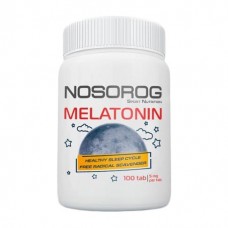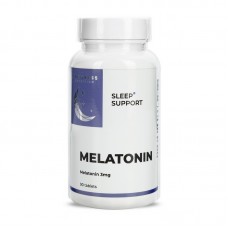Price: 0 uah
CheckoutMelatonin
Melatonin, also known as the sleep hormone, is naturally produced in the human body after darkness falls. It is mainly used to regulate the circadian rhythm, although it has a broader spectrum of activity. Its deficiency can cause disruptions in sleep patterns and concentration issues. Therefore, it is important to maintain an appropriate level of this hormone in the body.

What is Melatonin?
Melatonin is a hormone that naturally occurs in the human body and is derived from tryptophan. It is produced in the central nervous system by the pineal gland, one of the endocrine glands located in the brain.
The natural secretion of melatonin in the body is regulated by light and darkness. Melatonin release begins around 9:00 pm, reaching its highest concentration between 2 and 4 am, and gradually decreases around 7-9 am.
Exposure to light during sleep worsens sleep quality and reduces melatonin synthesis.
Approximately 30 mcg of melatonin is produced in the body daily. Melatonin levels decrease with age (around 40 years old, its concentration gradually decreases), making circadian rhythm disturbances common among elderly individuals.
Melatonin is necessary for maintaining a normal sleep-wake cycle. However, it also performs other functions in the body, and its effects can be considered diverse.
How Does Melatonin Work?
Melatonin is called the sleep hormone because, as mentioned earlier, it is responsible for regulating the circadian rhythm of sleep and wakefulness, ensuring the proper flow of the circadian cycle. Thus, it plays a significant role in regulating sleep hours throughout the day. It is used for symptoms of insomnia, including chronic insomnia and age-related sleep issues.
Melatonin can also help stabilize body temperature regulation and lower blood pressure.
Additionally, as an antioxidant, it exerts antioxidant effects. The hormone effectively fights free radicals, reduces oxidative stress, and can also help increase the activity of essential antioxidant enzymes such as superoxide dismutase or catalase.
A small amount of the sleep hormone is also produced in the digestive system, where it can slow down digestion processes and stimulate the pancreas to release enzymes. Moreover, melatonin can counteract excessive gastric juice secretion and participate in modulating gastrointestinal peristalsis.
Melatonin Deficiency
Symptoms of melatonin deficiency include:
- difficulty falling asleep at night,
- concentration problems,
- fatigue,
- irritability,
- distraction,
- worsening of well-being,
- difficulty waking up in the morning.
How to Naturally Replenish Melatonin Deficiency?
To take care of your body and maintain the proper sleep-wake cycle, pay attention to behaviors that can naturally help replenish melatonin deficiency.
Therefore, a good solution is to go to bed at a specific time. Ensure that uninterrupted sleep lasts 7-8 hours, as this is the time needed for the body to regenerate.
Include easily digestible foods in your last meal before sleep. It is beneficial if they are a source of tryptophan, which is involved in serotonin and melatonin production. These hormones influence relaxation and support circadian cycle regulation. Such foods include pumpkin seeds, cheese, fish, or milk.
Also, make sure to engage in daily physical activity, especially outdoors.
Excess Melatonin
Excessive melatonin can lead to unwanted symptoms such as:
- nausea,
- worsening of well-being,
- headaches,
- drowsiness,
- nightmares.
Excess melatonin can be caused by insufficient exposure to light, improper diet, and prolonged improper use of supplements.
Melatonin as a Dietary Supplement - For Whom?
Melatonin in supplement form is recommended especially for people suffering from sleep disorders - those who have trouble falling asleep and complain of waking problems in the morning.
Furthermore, supplements containing the sleep hormone are recommended for elderly individuals whose natural melatonin production gradually decreases, as well as blind individuals whose circadian cycle may also be disrupted.
Dietary supplements with melatonin are also suitable for travelers experiencing jet lag or shift workers.
Proper Use of Melatonin-Rich Supplements
The appropriate dosage of a supplement containing melatonin depends on age, body weight, and the concentration of the active ingredient in the product.
For circadian rhythm disturbances, doses of 1 to 5 mg per day are commonly used. Blind and sighted individuals are recommended to take melatonin-rich supplements after darkness falls, preferably an hour before bedtime. For sleep disturbances related to changing time zones, a melatonin dose of 1-3 mg is recommended. The supplement should be taken once a day in the evening for about three days.
Melatonin can be used for an extended period as it does not cause addiction. Therefore, melatonin intake can be considered safe.
Contraindications and Side Effects of Melatonin Use
Supplements containing melatonin should not be used in case of hypersensitivity to the active substance or any of the product's components. It is also not advisable to take the hormone after consuming alcohol.
It is not recommended to combine melatonin with certain sedatives and antidepressants, such as thioridazine or imipramine. Driving after taking a dietary supplement is also not recommended.
Be cautious when taking melatonin in patients with liver dysfunction, depression, or hormonal disorders.
Short-term use rarely causes side effects. These may include symptoms such as headaches, disorientation, or a decrease in body temperature.












